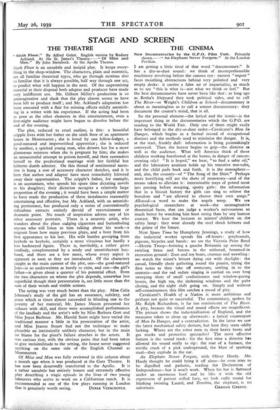THE CINEMA
New Documentaries by the G.P.O. Film Unit. Privately shown.—" An Elephant Never Forgets." At the London Pavilion.
I AM getting a little tired of that word "documentary." It has a dry-as-dust sound: we think of incomprehensible machinery revolving before the camera eye: earnest " expert " faces mouthing abstractions behind very polished and very empty desks: it carries a false air of impartiality, as much as to say "this is what is—not what we think or feel." But the best documentaries have never been like that : as long ago as Rotha's Shipyard they took political sides, and to call The River—or Wright's Children at School—documentary is about as meaningless as to call a sonnet documentary: they document the creator's mind, that is all.
So the personal element—the lyrical and the ironic—is the important thing in the documentaries which the G.P.O. are sending to the World Fair. Only one of them might easily have belonged to the dry-as-dust order—Cavalcanti's Men In Danger, which begins as a factual record of occupational diseases and the methods used to minimise the danger. It is, at the start, frankly dull : information is being painstakingly conveyed. Then the horror begins to grip—the director as well as the audience. What will America think of these children working barefooted at the looms, in danger of cancer- creating oils? "It is hoped," we hear, "to find a safer oil," and the laboratory assistant holds up his tentative test-tube, and the child pads back and forth. It is the atmosphere— and, alas, the country—of "The Song of the Shirt." Perhaps more horrifying still are the shots of monotony—and of the means taken to alleviate it: interminable trays of potted meat jars passing before stooping, spotty girls: the information that in a biscuit factory the girls can sing to relieve the boredom and "arc allowed to choose their own songs."
Allowed—a word to make the angels weep. We see psychological researchers at work—the unimaginative theoretical faces, that can judge a worker's nervousness so much better by watching him knot string than by any human contact. We hear the lectures to miners' children on the safety lamp : they wear already the steel shock helmets and the grime of the future.
Next Spare Time by Humphrey Jennings, a study of how the industrial worker spends his off-hours: greyhounds, pigeons, bicycles and bands: we see the Victoria Prize Band —Morris Troop—hoisting a gauche Britannia up among the twirling brass and batons in the withered, hemmed-in recreation ground: Zoos and toy boats, cinemas and wrestling: we watch the miner's leisure dying out with daylight : the casual, friendly choir gathering round the pianist, trying the first notes as they take off overcoats, settling in to the oratorio—and the sad sedate singing is carried on over long sweeping shots of small confectioners and window-gazing lovers, the high tea, the darkening windows and the pubs closing, and the night shift going on. Simply and without self-consciousness this film catches a mood of pity.
Cavalcanti's Health of a Nation is more ambitious and perhaps not quite so successful. The commentary, spoken by Mr. Ralph Richardson, is far too reminiscent of The River. A pity, because the visual and sound effects are magnificent. The picture shows the industrialisation of England, and the measures taken to clean up afterwards: a lyrical counterpart of Men In Danger, and a contradiction. In the latter we saw the latest mechanical safety devices, but here they seem oddly lacking. Where are the robot men in their heavy boots and gas masks and protective spectacles? The most effective feature is the sound track : for the first time a director has allowed his sound really to rip : the roar of a furnace, the terrific crack of a pick underground, the blast of sparking steel—they explode in the ear.
An Elephant Never Forgets, with Oliver Hardy. Mr. Hardy thought he could bring it off alone—he even tries to be dignified and pathetic, reading the Declaration of Independence—but it won't work. When his hat is flattened under an enormous hoof and he lifts it with the old expression of patient stifled fury, we look sadly round for blinking twisting Laurel, and Zenobia, the elephant, is no


























































 Previous page
Previous page